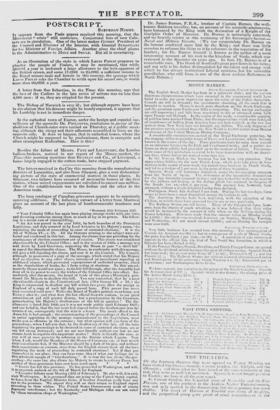The long catalogue of Canadian grievances appears to be constantly
receiving additions. The following extract of a letter from Montreal gives an account of the last piece of bumbureaucratie insolence and folly. "Montreal. 19th February 1937.
"Your Colonial Office has again been playing strange tricks with our laws, and throwing confusion among them as much as lay in its power. The follow- ing is a recent case of intermeddling. '6 An Act was passed in the year 1834, by both branches of the Provincial Legislature, and duly assented to by Lord AYLMER in his Majesty's name, 'for regulating the mode of proceeding in cases of contested elections.' It is the 4th of William IV., c. 28. All the Statutes relating to the subject were col- lected and condensed in this law. Among the clauses was one providing for the continuance of election committees out of session. This clause was considered objectionable by the Colonial Office; and in the session of 1835, a message was sent down by Lord COSEORD, requesting the House to pass "a short bill" to repeal the objectionable clause. The House, in conformity with this message, did pass a bill repealing the clause, and sent it to the Council. The Council, although in possession of a copy of the message, which stated that his Majesty had no oljection to any other clause, introduced an' amendment repealing an additional clause, which prevented coproprietors of undivided property, (such as the shareholders of banks, &c.) from voting at elections. To this amend- ment the House would not agree; so the bill fell through, after the Assembly had done all in its power to carry the wishes of the Colonial Office into effect. Im- mediately after the session, the board of trade of this place (Montreal), peti- tioned his Majesty to disallow this bill. You may remember, that by a most objectionable clause in the Constitutional Act, (31st George III. c 31.) the King is empowered to disallow any bill within two years after the receipt in England of a copy of such bill duly passed here. This power has nerer been exercised until sore! Well—the Board of Trade's petition went home, and Ewer: after it ; and what does the last official Gazette contain, to our great astonishment and still greater dismay, but a proclamation by the Governor, promulgating his Majesty's disallowance of the bill in ques • ! The dis allowance is dated July 1836, yet it was not made public until February 1837; and our belief is, that the two years had elapsed before the disallowance was de- termined on, consequently that the date is a fraud. The insult offered to the Assembly is bad enough: the countenancing if the proceedings of the Council iu entire opposition to the message communicated to the Legislature, must strike you as offensive in the extreme ; but what opinion will you form of the proceedings. when I tell you that, by the disallowing of this Act, on the laws regulating the proceedings to be observed in cases of contested elections, are at one fell swoop destroyed ; and we are now literally without one law on our statute-hook to regulate this important matter ! Such is literally the ease, as you will at once perceive by referring to the Statute which I quote. Now what, I ask, would the Members of the House of Commons say, or how would their constituents lVel, if the Minister should by a dash of his pen, and without their concurrence or consent, erase from the English statute-book all the laws regulating the mode of proceeding in contested elections? Yet if they put themselves in our place, they can form some idea of what our feelings are in this wholeeale sample of " tomahawking." It is true the law allows the pro- ceeditig—the same law also allows his Majesty to create hereditary Peers, but neither of these provisions have ever been acted upon. • • • f' Glees has left this province,. Ile has proceeded to Washington, and will, it HI expected, embark on the 8th of March for England. " ELLIOTT follows next Monday (23d of February). He also will, it is said, visit Washington. It is presumed they are going to the United States capital, to learn flout the English Minister there, if brother Jonathan really have any eye to the province. We expect they will on their return to England report according to their wishes. The lInited States Government must of course deprecate interference ; but the Kentucky end Michigan rifles are not ruled by'them tarnation chaps at Washirigton.' " Dr. James Burnes, R. R. S., brother of Captain Burnes, the well- known Bokhara traveller, has, on account of his scientific attainments,. been honoured by the King with the decoration of a Knight of the Guelphic Order of Hanover. Dr. Burnes is universally esteemed, and we heartily rejoice at this testimony of his Sovereign's favour.— Naval and Military Gazette. We too congratulate Dr. Burnes on the honour conferred upon him by the King ; and there was little occasion to enhance his claim to it by reference to the reputation of his brother ; for Dr. Burnes himself is known as the author of a most interesting account of his visit to the kingdom of Sinde, which was reviewed in the Spectator six years ago. In fact, Dr. Burnes is of a remarkable race. The blood of Scotland's great poet flows in his veins; and not only is his father distinguished for the talent arid energy with which he has always maintained Liberal opinions, hut his venerable grandfather, who still lives, is one of the most zealous Reformers in North Britain.'


























 Previous page
Previous page